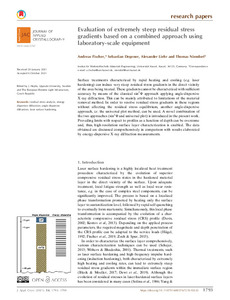Aufsatz
Artikel (Publikationen im Open Access gefördert durch die UB)

Evaluation of extremely steep residual stress gradients based on a combined approach using laboratory-scale equipment
Zusammenfassung
Surface treatments characterized by rapid heating and cooling (e.g. laser hardening) can induce very steep residual stress gradients in the direct vicinity of the area being treated. These gradients cannot be characterized with sufficient accuracy by means of the classical sin2Ψ approach applying angle-dispersive X-ray diffraction. This can be mainly attributed to limitations of the material removal method. In order to resolve residual stress gradients in these regions without affecting the residual stress equilibrium, another angle-dispersive approach, i.e. the universal plot method, can be used. A novel combination of the two approaches (sin2Ψ and universal plot) is introduced in the present work. Prevailing limits with respect to profiles as a function of depth can be overcome and, thus, high-resolution surface layer characterization is enabled. The data obtained are discussed comprehensively in comparison with results elaborated by energy-dispersive X-ray diffraction measurements.
Zitierform
In: Journal of Applied Crystallography Volume 54 / Part 6 (2021-11-30) , S. 1793-1798 ; eissn:1600-5767Förderhinweis
Gefördert im Rahmen des Projekts DEALSammlung(en)
Publikationen (Fachgebiet Metallische Werkstoffe)Artikel (Publikationen im Open Access gefördert durch die UB)
Zitieren
@article{doi:10.17170/kobra-202112095210,
author={Fischer, Andreas and Degener, Sebastian and Liehr, Alexander and Niendorf, Thomas},
title={Evaluation of extremely steep residual stress gradients based on a combined approach using laboratory-scale equipment},
journal={Journal of Applied Crystallography},
year={2021}
}
0500 Oax
0501 Text $btxt$2rdacontent
0502 Computermedien $bc$2rdacarrier
1100 2021$n2021
1500 1/eng
2050 ##0##http://hdl.handle.net/123456789/13580
3000 Fischer, Andreas
3010 Degener, Sebastian
3010 Liehr, Alexander
3010 Niendorf, Thomas
4000 Evaluation of extremely steep residual stress gradients based on a combined approach using laboratory-scale equipment / Fischer, Andreas
4030
4060 Online-Ressource
4085 ##0##=u http://nbn-resolving.de/http://hdl.handle.net/123456789/13580=x R
4204 \$dAufsatz
4170
5550 {{Eigenspannung}}
5550 {{Beugung}}
5550 {{Oberfläche}}
5550 {{Laboreinrichtung}}
7136 ##0##http://hdl.handle.net/123456789/13580
<resource xsi:schemaLocation="http://datacite.org/schema/kernel-2.2 http://schema.datacite.org/meta/kernel-2.2/metadata.xsd"> 2022-01-31T15:34:56Z 2022-01-31T15:34:56Z 2021-11-30 doi:10.17170/kobra-202112095210 http://hdl.handle.net/123456789/13580 Gefördert im Rahmen des Projekts DEAL eng Namensnennung 4.0 International http://creativecommons.org/licenses/by/4.0/ residual stress analysis energy-dispersive diffraction angle-dispersive diffraction laser surface hardening 620 Evaluation of extremely steep residual stress gradients based on a combined approach using laboratory-scale equipment Aufsatz Surface treatments characterized by rapid heating and cooling (e.g. laser hardening) can induce very steep residual stress gradients in the direct vicinity of the area being treated. These gradients cannot be characterized with sufficient accuracy by means of the classical sin2Ψ approach applying angle-dispersive X-ray diffraction. This can be mainly attributed to limitations of the material removal method. In order to resolve residual stress gradients in these regions without affecting the residual stress equilibrium, another angle-dispersive approach, i.e. the universal plot method, can be used. A novel combination of the two approaches (sin2Ψ and universal plot) is introduced in the present work. Prevailing limits with respect to profiles as a function of depth can be overcome and, thus, high-resolution surface layer characterization is enabled. The data obtained are discussed comprehensively in comparison with results elaborated by energy-dispersive X-ray diffraction measurements. open access Fischer, Andreas Degener, Sebastian Liehr, Alexander Niendorf, Thomas doi:10.1107/S1600576721010335 Eigenspannung Beugung Oberfläche Laboreinrichtung publishedVersion eissn:1600-5767 Part 6 Journal of Applied Crystallography 1793-1798 Volume 54 false </resource>
Die folgenden Lizenzbestimmungen sind mit dieser Ressource verbunden:


